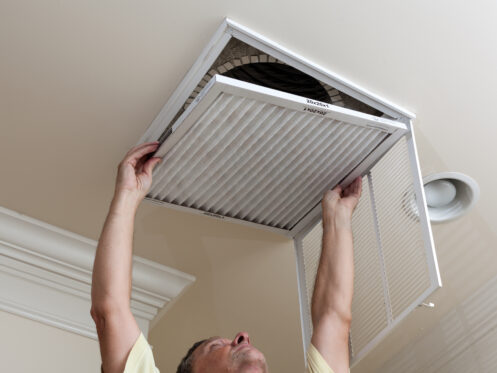Among the most important steps in protecting the HVAC equipment in your Palm Beach, FL home is regularly changing your air filter. This component sieves out hair, dust, carpet fibers, and other particulates as air enters your heating and cooling system. Although air filters supply a limited range of indoor air quality (IAQ) benefits, they primarily exist to protect sensitive HVAC components. They play a critical role in maintaining acceptable operating conditions and limiting HVAC system stress. The following is everything you need to know about performing air filter replacements, including how often you should do so.
General Recommendations for HVAC Air Filter Changes
General recommendations for HVAC air filter replacement suggest inspecting these components monthly and replacing them every 30 to 90 days. This schedule works best for the standard air filters that come pre-installed in HVAC equipment. Standard filters have modest minimum efficiency reporting value (MERV) ratings, limited surface area, and simple, pleated designs. In most households, they aren’t capable of capturing and retaining more than three month’s worth of debris.
If you wait longer than 90 days to check and change your filter, trapped debris could get blown off this component during HVAC operation. This is often why homeowners have thick buildups of lint-like material on and just behind their HVAC air vents. It also accounts for a fair amount of the debris that collects in HVAC air ducts over time.
Can I Change the Air Filter Myself?
During AC, heat pump, and furnace tune-up service, HVAC technicians check and change air filters. However, given that most heating and cooling equipment receives tune-up service just once each year, you’ll need to inspect and replace your filter in between these visits. Changing air filters is one of several maintenance tasks that homeowners must perform to maintain compliance with their equipment manufacturer warranties. Thus, not only can you change your air filter, you should.
How Do I Know My Air Filter Needs to Be Replaced?
There’s a quick and easy way to determine whether an air filter has reached the end of its lifespan. Simply take this component out and hold it up to an overhead light. In theory, if light can still pass through a filter’s mesh, air can pass through it as well. When filter mesh is excessively dusty and opaque, continuing to use it could cause your heating and cooling equipment to short cycle, overheat, or shut down.
Other Signs Your HVAC Air Filter Is Ready for Replacement
Dirty air filters lie at the heart of many common HVAC issues. In addition to short-cycling, overheating, and sudden shutdowns, dirty air filters can cause:
- Increased indoor humidity
- Unpleasant odors during HVAC operation
- Rising home energy bills
- Decreased airflow
- Unpleasant IAQ-related symptoms
If people in your household are suddenly dealing with itchy, watery eyes, coughing, sneezing, or wheezing, a dirty air filter could be to blame.
Timing Filter Replacements for Upgraded HVAC Air Filters
Every HVAC air filter sold in North America is assigned a MERV rating that runs from 1 through 20, with 20 being the highest quality rating. For residential HVAC systems, most filters have MERV ratings between 6 and 13, and some have MERV ratings as high as 15.
The higher that a filter’s MERV rating is, the more allergens and contaminants it can extract. High-rated filters have thicker profiles, denser mesh, and greater surface area than standard filters do. In most cases, these attributes also mean that they have longer lifespans.
If you’re using an air filter with a MERV rating of 13 or higher, you might not need to replace it more than once every six to nine months. However, whenever homeowners upgrade their air filters or deviate from the general, recommended filter change schedule, it’s best to do so under the guidance of a licensed HVAC company.
We can help you establish a needs-specific routine for keeping this component in excellent condition and preventing the loss of warranty protections. We can also help you make filter upgrades without negatively impacting airflow or HVAC performance.
IAQ Concerns That May Make It Necessary to Your Change Filters More Often
In addition to your filter’s MERV rating, several environmental factors can impact the lifespan of your air filters. Some homes have far more dust, dander, pollen, and other particulates floating around than others. This may be the case in your home if you:
- Have multiple indoor pets
- Live near a busy freeway
- Haven’t landscaped your yard
- Live near active construction
- Have lots of foot traffic
This is why performing monthly filter inspections is so important. These quick and easy check-ups ensure that filter debris doesn’t inhibit airflow for long or have any significant impact on IAQ or HVAC performance.
Tips for Changing Your Air Filter for the First Time
If you’ve never changed the air filter in a central HVAC system before, ask your technician to watch this process during your next tune-up service. If you purchased existing construction with existing HVAC equipment, it’s best to have your AC or heat pump professionally assessed before turning it on.
Air filters are usually installed in or next to air handling units, in return ducts, or in furnace blower compartments. Some HVAC systems have more than one. Having a professional walk you through this process before tackling it on your own will ensure that nothing is missed and that your new filter is sized and oriented correctly.
What to Do if Your HVAC Air Filter Is Extremely Dirty
If you’ve skipped a few air filter changes or if you purchased or inherited a home with a dirty air filter installed, swapping this component out might not be enough to restore optimum heating and cooling performance. You should additionally check your air registers or vents for evidence of blown-off filter debris. If these features are dirty, you can wipe them down with a damp cloth. You can also remove HVAC air vent covers and clean behind them using your vacuum cleaner’s hose attachments.
According to the National Air Duct Cleaners Association (NADCA), homeowners should have their HVAC air ducts cleaned every two to three years. Even the U.S. Environmental Protection Agency (EPA) suggests having ducts cleaned on an as-needed basis. When extremely dirty air filters cause IAQ-related symptoms or performance issues like short cycling and overheating, professional air duct cleaning can help.
Short Filter Lifespans and Ongoing IAQ Concerns
If your standard air filters only last a month or less, you might need additional IAQ support. When homeowners struggle with limited filter lifespans and recurring IAQ-related symptoms, integrated HVAC accessories like air scrubbers, air purifiers, and media filters can often solve the problem. Installed on or in ducting, these supplementary appliances clean conditioned air just before distribution. If needed, the right integrated accessory can extend the lifespans of both your air filters and your HVAC equipment.
We help homeowners in Palm Beach, FL protect their IAQ and their heating and cooling systems. We offer outstanding AC, heat pump, and ductless mini-split maintenance, installation, and repair services. We also provide plumbing, drain, and sewer services as well as advanced indoor air quality improvements. To schedule an appointment or find out about our preventative maintenance plan, get in touch with Erica's Plumbing, Air Conditioning & Restoration today.

